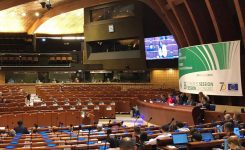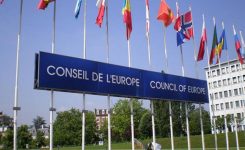E-News, coesione, Ultime Notizie, Notizie
Bonaccini al forum del CdR: “politica di coesione fondamentale per ripresa economica”
Stefano Bonaccini, Presidente AICCRE e CCRE/CEMR, è intervenuto il 9 maggio al forum on-line del Comitato delle regioni e dei poteri locali (CdR) “Europe Day for Regions and Cities: “Regions and cities: vital for Europe’s recovery” (Giornata dell’Europa”Regioni e città: vitali per la ripresa dell’Europa”. Gli enti locali e regionali si pongono come soggetti imprenscindibili per la ripresa dell’Unione europea dopo la pandemia di Covid-19.
Il forum è stato articolato in tre sessioni tematiche, aperte dal presidente del CdR, Apostolos Tzitzikostas. Bonaccini è intervenuto, insieme ad altri quattro membri della Cohesion Alliance, sul tema: “CohesionAlliance 2.0 – La Dichiarazione per un’Europa coesiva e resiliente”, alla presenza, tra gli altri, di
Elisa Ferreira, Commissario europeo per la Coesione e le Riforme.
“Stiamo attraversando una tragedia. Perdita di vite, perdita di posti di lavoro, dolore per non poter essere vicini ai nostri parenti, familiari e amici. Ho assistito in prima persona agli sforzi e ai sacrifici dei nostri medici, infermieri, agenti di polizia, raccoglitori di rifiuti, dipendenti pubblici, volontari e innumerevoli altri nella lotta per proteggere i nostri cittadini dal virus e continuare a servire la loro comunità”, ha esordito Bonaccini.
ASCOLTA L’AUDIO DELL’INTERVENTO DEL PRESIDENTE STEFANO BONACCINI
“Ma in mezzo a questa turbolenza, dobbiamo dimostrare capacità di ripresa collettiva e ciò significa che dobbiamo pensare alla società di domani e all’Europa di domani.
La risposta dell’Unione europea a questa crisi ha indicato la strada. Abbiamo bisogno della solidarietà europea, tra paesi, ma anche, ed è stato dimostrato, tra regioni e città”, ha sottolineato il Presidente del CCRE/CEMR.
Quale delle politiche dell’Unione europea potrebbe essere più rappresentativa di questa solidarietà rispetto alla politica di coesione? “Il CCRE/CEMR è stato uno dei membri fondatori della Cohesion Alliance. Questo perché crediamo fermamente che la politica di coesione abbia già dimostrato e continuerà a dimostrarne la pertinenza e l’utilità per I territori e i cittadini europei. In realtà-ha continuato Bonaccini-la politica di coesione potrebbe essere oggi più rilevante che mai. Il coronavirus si è diffuso in modo diverso nei diversi territori e ha esacerbato le vulnerabilità dei territori”.
“I governi locali e regionali sono duramente colpiti da questa crisi: devono aumentare il loro sostegno ai cittadini e alle PMI, mentre le loro entrate ne risentiranno gravemente. In questo contesto, il sostegno dell’Unione europea non è un lusso, ma sarà vitale”, ha ammonito il Presidente.
“Esortiamo gli Stati membri a concordare entro la fine di quest’anno un bilancio dell’UE post 2020 che risponda alle sfide che stiamo affrontando e con una politica di coesione abbastanza forte da rispondere alle nostre esigenze di ripresa sostenibile a medio e lungo termine”.
“Anche se continuiamo a lottare ogni giorno per salvare vite umane, abbiamo già bisogno di rilanciare la ripresa e pensare a come le nostre società dovrebbero uscire da questa crisi”.
“Ora, più che mai, dobbiamo reinvestire nell’economia bloccata delle città, dei comuni e delle regioni. Dobbiamo ridisegnare i nostri territori per renderli resilienti e innovativi: questo può essere fatto solo attraverso la politica di coesione e il finanziamento”, ha sottolineato Stefano Bonaccini.
“La politica di coesione europea sarà necessaria come base per ricostruire l’economia, promuovere la sostenibilità e rafforzare la coesione territoriale e sociale all’interno dell’Unione. Sarà particolarmente importante tenere pienamente conto dell’impatto sociale ed economico di questa crisi per l’attuazione della politica di coesione post-2020”.
“Oltre alla risposta della Commissione europea con l’iniziativa di investimento di risposta al Coronavirus (o CRII), la politica di coesione dovrà sostenere una prospettiva di sviluppo a più lungo termine: contribuirà anche a trasformare le nostre società in linea con gli obiettivi di sviluppo sostenibile, e in linea con l’”accordo verde” presentato dal Presidente della Commissione europea”.
Il Presidente del CCRE/CEMR ha quindi esortato la Commissione europea “a rimanere in stretto contatto con noi rappresentanti dei governi locali e regionali, in modo da poter trasmettere i bisogni concreti dei terrori e le sfide che stiamo affrontando e pensare insieme al miglior percorso da intraprendere verso la ripresa”.
La politica di coesione è stata al centro della risposta dell’UE alla crisi economica del 2008. “Ora richiederà ancora più finanziamenti per essere all’altezza della sfida futura, ma gli Stati membri devono capire che un bilancio UE forte non è un costo ma un’opportunità per tutti noi, per i nostri territori e cittadini di diventare più resilienti”.
“Questa è anche un’opportunità per mostrare il valore aggiunto dell’Europa e i suoi benefici concreti per i cittadini europei”.
Il forum si è svolto due giorni dopo l’adozione da parte del CdR di una dichiarazione politica sulla risposta europea alla crisi di Covid-19 e nel contesto della nuova proposta di bilancio dell’UE per il 2021-2027 che sarà annunciata dalla Commissione europea entro maggio.
Stefano Bonaccini, President AICCRE and CCRE/CEMR, spoke on May 9 at the online forum of the Committee of the Regions and Local Authorities (CoR) “Europe Day for Regions and Cities: vital for Europe’s recovery”. Local and regional authorities are key players in the recovery of the European Union after the Covid-19 pandemic.
The forum was divided into three thematic sessions, opened by CoR President Apostolos Tzitzikostas. Bonaccini spoke, together with four other members of the Cohesion Alliance, on the theme: “CohesionAlliance 2.0 – The Declaration for a cohesive and resilient Europe”, in the presence, among others, of Elisa Ferreira, European Commissioner for Cohesion and Reforms.
“We are going through a tragedy. Loss of life, loss of jobs, pain for not being able to be close to our relatives, family and friends. I have witnessed firsthand the efforts and sacrifices of our doctors, nurses, police officers, garbage collectors, civil servants, volunteers and countless others in the struggle to protect our citizens from the virus and continue to serve their community,”.
“But in the midst of this turbulence, we have to show collective resilience and that means we have to think about tomorrow’s society and tomorrow’s Europe. The European Union’s response to this crisis has shown the way. We need European solidarity, between countries, but also, and this has been demonstrated, between regions and cities”, stressed the President of the CEMR/CEMR.
Which of the European Union’s policies could be more representative of this solidarity than cohesion policy? “The CEMR/CEMR was one of the founding members of the Cohesion Alliance. This is because we firmly believe that cohesion policy has already demonstrated and will continue to demonstrate its relevance and usefulness for European territories and citizens. In fact – continued Bonaccini- cohesion policy could be more relevant today than ever before. The coronavirus has spread differently in different territories and has exacerbated the vulnerabilities of the territories”.
“Local and regional governments are hard hit by this crisis: they need to increase their support for citizens and SMEs, while their income will be severely affected. In this context, EU support is not a luxury, but it will be vital”, warned the President.
“We urge Member States to agree by the end of this year on a post-202020 EU budget that responds to the challenges we are facing and with a cohesion policy strong enough to meet our needs for sustainable recovery in the medium and long term”.
“Even as we continue to fight every day to save lives, we already need to relaunch recovery and think about how our societies should emerge from this crisis”.
“Now, more than ever, we need to reinvest in the frozen economy of cities, municipalities and regions. We need to redesign our territories to make them resilient and innovative: this can only be done through cohesion policy and financing”, Stefano Bonaccini stressed.
“European cohesion policy will be necessary as a basis for rebuilding the economy, promoting sustainability and strengthening territorial and social cohesion within the Union. It will be particularly important to take full account of the social and economic impact of this crisis for the implementation of post-2020 cohesion policy”.
“In addition to the European Commission’s response to the Coronavirus (or CRII) investment initiative, cohesion policy will need to support a longer-term development perspective: it will also contribute to transforming our societies in line with sustainable development objectives, and in line with the “Green Agreement” presented by the President of the European Commission”.
The President of the CEMR/CEMR therefore urged the European Commission “to stay in close contact with us, representatives of local and regional governments, so that we can convey the concrete needs of the terrors and the challenges we are facing and think together about the best way forward towards recovery”.
Cohesion policy has been at the heart of the EU’s response to the 2008 economic crisis. “It will now require even more funding to meet the challenge ahead, but Member States must understand that a strong EU budget is not a cost but an opportunity for all of us, for our territories and citizens to become more resilient.
“This is also an opportunity to show the added value of Europe and its concrete benefits for European citizens”.
The forum took place two days after the CoR adopted a political declaration on Europe’s response to the Covid-19 crisis and in the context of the new EU budget proposal for 2021-2027 to be announced by the European Commission by May.








